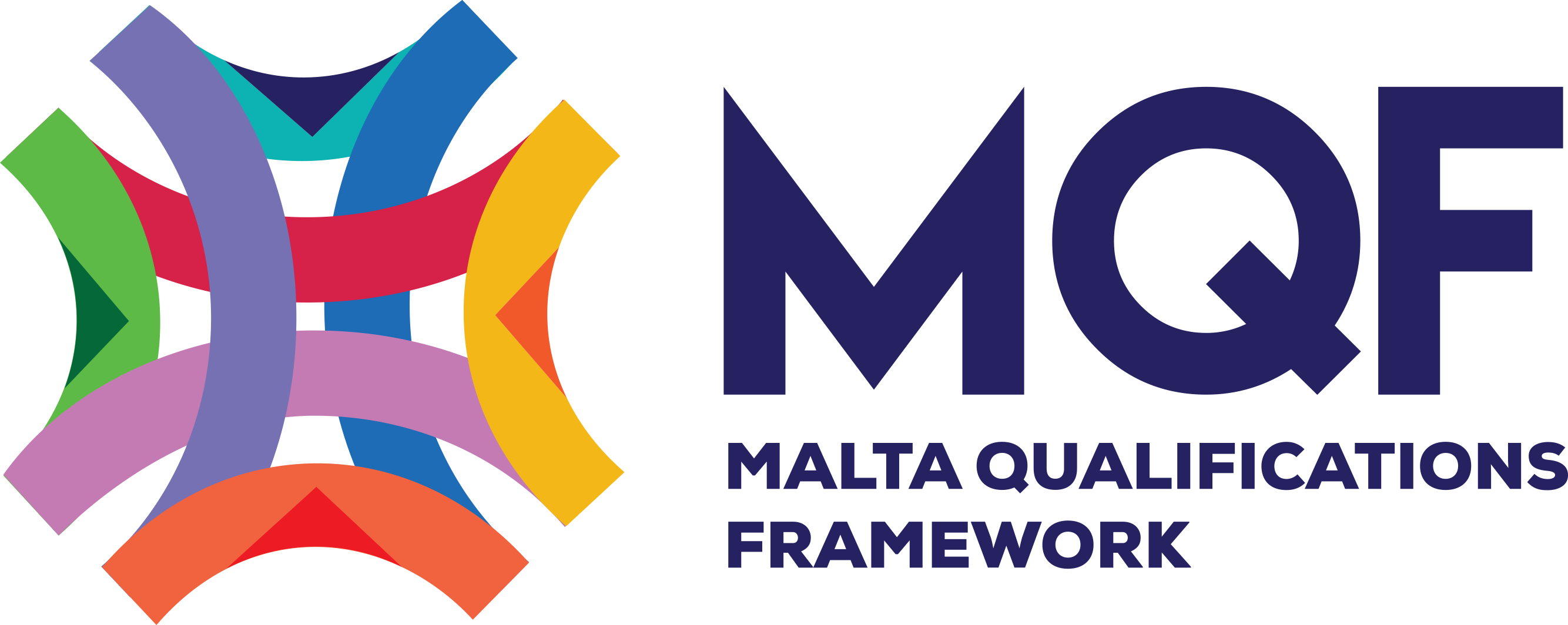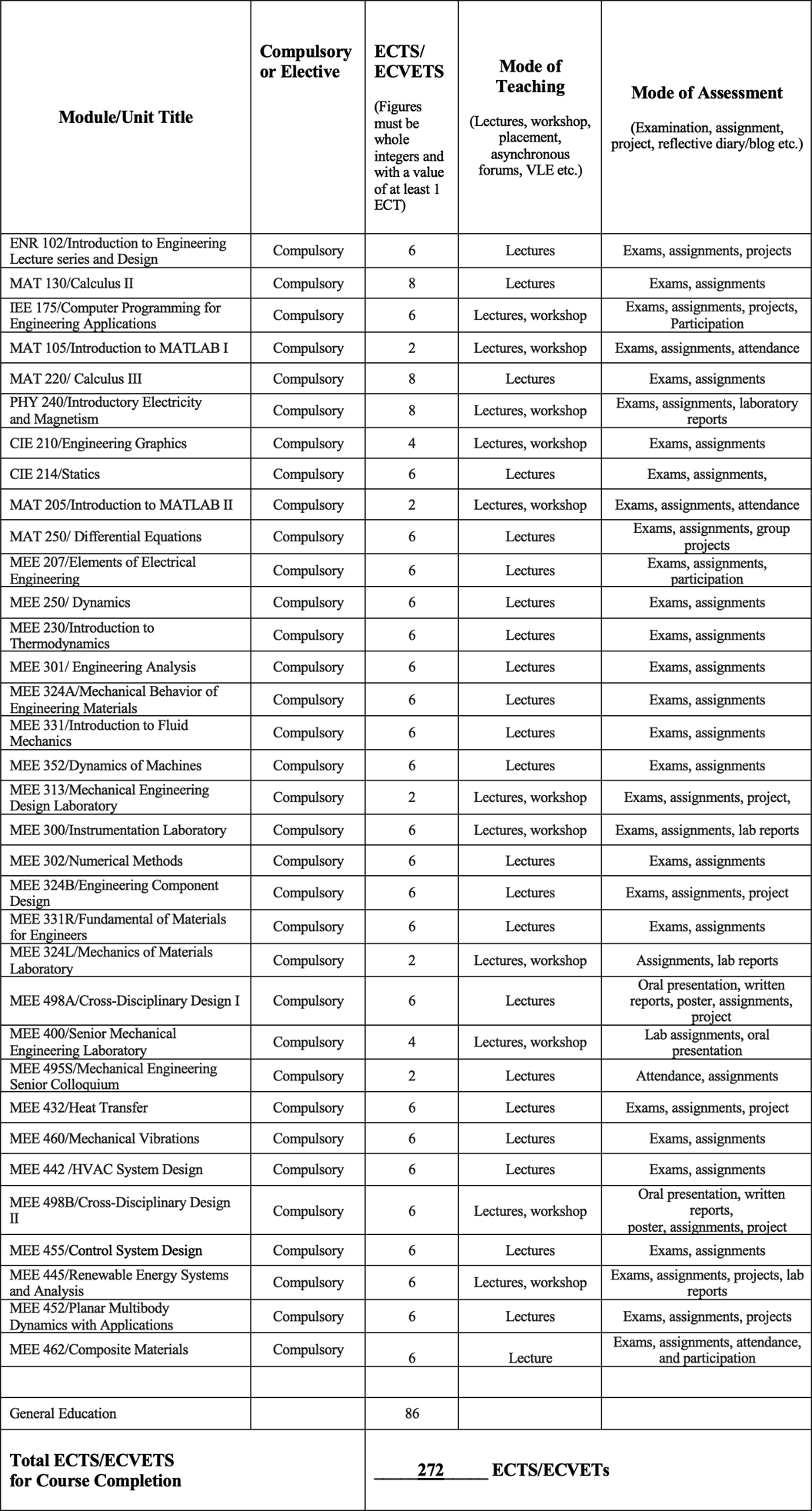BSc in Mechanical Engineering

This Program is accredited by the MFHEA
Degree Overview for Mechanical Engineering
Mechanical engineers design and manufacture everything from small individual parts and devices to large systems such as automobiles and spacecraft. In order to accomplish this, a broad range of skills are needed including the ability to analyze and model the mechanics of solids, fluids and the flow of heat and energy. Since these skills are required for virtually everything that is made, mechanical engineering is perhaps the broadest and most diverse of engineering disciplines. Mechanical engineers play a central role in such industries as aerospace, automotive, biomedical and manufacturing. Therefore, a degree in mechanical represents an entry point into today’s modern high-tech workforce. This course fulfills that training requirement.
Entry Requirements for this Program
Entry Requirements
Materials required in the undergraduate admissions application:
Official AUM application – Personal statement · Secondary school transcript – Minimum of grades 10 and 11 – Documents should be in English – Official transcript and diploma must be presented before course commences, teacher or counselor recommendation letter · ACT* or SAT* results (for students from the United States of American) · Proof of English Proficiency (for students who did not graduate from a secondary school using English as a medium of instruction).
Acceptable proof of English proficiency includes: – IELTS – TOEFL – ACT* or SAT* English/reading score results – Other forms can be decided on a case-by-case situation Undergraduate Admission Requirements · 12 years of schooling expected · Secondary school completion, which can include: – High School Program § 80% or above for grades 10 and 11 in a US system or the equivalent standards in other countries – IB Certificate – GCSE/IGCSE (General Certificate of Secondary Education/International GCSE) § Five subject exams with grades of D or above on each § A/S or A Levels with a minimum of D – For Maltese secondary (sixth form) schooling: § Matriculation certificate · 5 or above in English and Mathematics § A/S or A Levels: three subject exams with a minimum of D – Other school leaving certificate may be considered § Can include IB, AP, or EB · Proof of English Proficiency (for students who did not graduate from a secondary school using English as a medium of instruction).
Acceptable proof of English proficiency includes: – IELTS minimum of 6.0 – TOEFL § 550 minimums for paper based § 79 minimum iBT § 213 minimum cBT – ACT or SAT English score results § ACT reading 18 or above and 20 or above in English § SAT reading and writing score of 550 or above – IGCSE English as a second language § Grade C or above – Other forms can be decided on a case-by-case situation Admissions decisions are based equally on the above requirements as follows: · 25% on the student high school averages in grades 10 and 11 · 25% on the English proficiency test and/or on the SAT or ACT · 25% A consideration of personal qualities and academic motivation, as determined in the completed application and personal statement · 25% recommendations from teachers and school counselor Work Experience: It is possible that in a particular case a student who does not meet the required minimum grades may be admitted if he or she has significant related experience in a particular field of at least 2 years.
Additional requirements:
Please note that the admissions requirements for specific degree programs may be higher than the general requirements indicated here. For example, degree programs in Engineering require: · IELTS score of 6.5 For Engineering Students from the British System: · A level A2 mathematics · BBB at A Level · GSCE: Science C. · At least one other Science/Technology subject (or equivalent qualification) from the following: Electronics, Materials Science, Physics, Biology, Chemistry, Geology, IT, Further Mathematics, Mechanics, Dynamics or General Engineering. · Minimum grades at GCSE and AS level are set at C · Other suitable skills or experience gained in a relevant industry may be considered.
*The ACT and SAT can be done several times and the highest scores from each section will be used. Conditional admission is offered for applicants who meet all requirements except English proficiency. Conditional admits must enroll as full-time students in the AUM English for Academic Purposes program. The minimum English Proficiency scores for conditional admits is 4.5 IELTS for undergraduates (or equivalent) or 5.5 IELTS for graduate students (or equivalent).
Program Details
Program length:
48 Months
GPA needed to earn the degree:
2.0 or higher
Credits needed to earn the degree:
136 US credits / 272 ECTS
Degree level:
MQF Level 6
Pass Rate:
73%
Overall Course Learning Objectives
As a result of input from our constituents, the Mechanical Engineering Program objectives and indicators are:
- Objective 1: Graduates become practicing engineers who contribute to, and succeed and advance within their companies, institutes or agencies.
- Objective 2: Graduates succeed in graduate school in mechanical engineering or other fields that benefit from the skills and knowledge gained through their undergraduate education.
- Objective 3: Graduates engage in life-long learning and acquire new knowledge and skills through practice and advanced education to adapt to the changing demands of the work environment throughout their careers.
Program Learning Outcomes
Learning Outcomes
Outcomes for Communication Skills for the whole course,
The learner will be able to:
a) prepare professional proposals and reports.
b) competently deliver oral presentations to technical and lay audiences.
c) develop and use effective audio/visual aids.
d) write effective professional communications such as email and memorandums.
e) communicate within the engineering disciplines through plans and drawings.
Learning Outcomes for Learning to Learn Skills for the whole course,
The program must have documented student outcomes that support the program educational objectives. Attainment of these outcomes prepares graduates to enter the professional practice of engineering. (a) An ability to apply knowledge of mathematics, science and engineering. (b) An ability to design and conduct experiments, as well as to analyze and interpret data. (c) An ability to design a system, component or process to meet desired needs within realistic constraints such as economic, environmental, social, political, ethical, health and safety, manufacturability, and sustainability. (d) An ability to function on multidisciplinary teams. (e) An ability to identify, formulate, and solve engineering problems. (f) An understanding of professional and ethical responsibility. (g) An ability to communicate effectively. (h) The broad education necessary to understand the impact of engineering solutions in a global, economic, environmental and societal context. (i) A recognition of the need for, and an ability to, engage in life-long learning. (j) A knowledge of contemporary issues. (k) An ability to use the techniques, skills and modern engineering tools necessary for engineering practice.
General Pedagogical Methods used for this Program
Modules will be taught in traditional lecture and flipped classroom models. The flipped classroom model will be applied for approximately half of the program coursework. Here, prior to attending class, students will view a set of recorded short lectures and take quizzes on that material. Lecture material will incorporate materials for various learning styles and take advantage of visualisation opportunities readily available in this mode. Students will then attend classes that are led by an on-site instructor who may clarify concerns on the material. The emphasis, however, is to lead in-class exercises that will cater to different learners through student-led exercises (problems, design projects, instructing on software, discussions, etc). Often these sessions will be in a collaborative learning environment in which students work in small groups. In special cases, the instructor will provide supplementary lecture material. Out of class reading and homework assignments will then be assigned, submitted and graded. Students also have the opportunity to engage in one-on-one instruction through office hours. The remainder of the coursework will be taught in a standard classroom mode of lectures with outside of class exercises, homework and projects. In this mode, lectures will be provided during class periods. Lectures will incorporate materials different learning styles and may include example and/or student or instructor-led problem solving. Office hours and, for some courses, problem recitations will be held to reinforce learning. Laboratory courses involve two to three-hour laboratory sessions in which students complete assignments involving hands-on laboratory experiments and supplemental data analysis either individually or as part of groups. Laboratories are assessed using written lab reports and/or oral presentations.
General Assessment Policy and Procedures
Assessments
Engineering disciplines require strong mathematics skills. Assessments (in-class examinations, homework and individual and team projects) will focus on those skills. In general, grades will be assigned based on performance on those assessments. Students with learning disabilities will be addressed by providing additional time or quiet settings for examinations for those students as determined appropriate.
Cheating and Plagiarism
Exams will be administered in classroom settings by the on-site co-professor. Appropriate identification will be required. Class notes or limited sets of materials may be available to students during exams. Only simple calculators without memory cards will be permitted to avoid students bringing additional materials to assessments. The plagiarism tool, Turn-it-in, will be applied to document reports and papers are not copied from other sources without proper citation.
Relationship to Occupation/s
Mechanical engineering applies mathematics, physics and material science principles to analyze, design, manufacture and maintain mechanical systems. Core topics taught in the curriculum include solid and fluid mechanics, thermal sciences, dynamics and controls, and mechanical design. Students also learn machine dynamics, energy and power systems, mechanical properties of engineering and biomaterials, computational methods, HVAC systems, and instrumentation. Graduates of the Mechanical Engineering program go on to careers in a wide range of engineering sectors, including the defense, biomedical, manufacturing, mining, and automotive industries
Program Structure Sample
